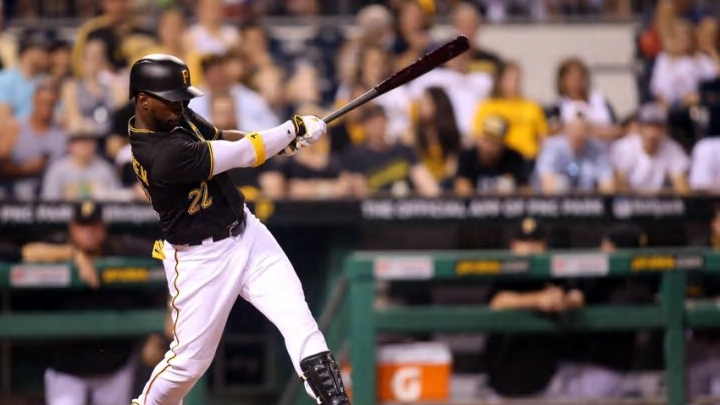Yesterday, we discussed why the Pittsburgh Pirates should hang on to Andrew McCutchen. Now, here is the other side of the argument – why the Pirates should move on from their talented center fielder.
On Saturday, my Call to the Pen colleague Ron Juckett wrote a piece outlining his rationale as to why he felt it would be in the Pittsburgh Pirates best interest to, at least for now, hang onto Andrew McCutchen. Central to his thesis were a pair of silently implied suggestions that I happen to disagree with: First, that the 2016-17 versions of the Pirates are capable of making a deep playoff run. Second, that their competitive window is uncertain beyond that time.
If one accepts both of these ideas then hanging onto McCutchen would seem to make sense. Under these conditions the only situation that would call for an exploration of his trade value would be a 2017 Pirates team fading in the mid-summer standings.
More from Call to the Pen
- Philadelphia Phillies, ready for a stretch run, bomb St. Louis Cardinals
- Philadelphia Phillies: The 4 players on the franchise’s Mount Rushmore
- Boston Red Sox fans should be upset over Mookie Betts’ comment
- Analyzing the Boston Red Sox trade for Dave Henderson and Spike Owen
- 2023 MLB postseason likely to have a strange look without Yankees, Red Sox, Cardinals
However, the Pirates do have an organizational foundation that should enable them to remain competitive well into the post-McCutchen future. The likes of Starling Marte, Gregory Polanco, Jung Ho Kang won’t be hitting the free agent market for several more seasons, while their young pitching core, which figures to be serve as the nucleus of their team for the next decade, features Gerrit Cole being adorned by the likes of young studs Tyler Glasnow and Jameson Taillon.
They have one of the better run farm systems in all of baseball, and an astute front office that has proven their ability to identify the right auxiliary parts to plug in at the right price (i.e. finding Josh Harrison, buying low on Francisco Liriano, renting Justin Morneau, reinventing A.J. Burnett, etc); critical for any team working with a small market budget.
So, the long term window is open. However, as for the plausibility of the Pirates hosting a ticker tape parade sometime in the next twenty-four months, the odds are considerably less favorable.
As they are currently constructed, in combination with the landscape of the NL Central and National League overall, the Pirates appear to be relegated to having to overcome the laborious obstacles of participating in the one-game wild card. The odds of coming out of such, and then beating back a team with a rotation like that of the Cubs, Nationals, Giants, or Mets, while spotting them the handicap of having Cole unavailable until Game 3 at the earliest, are remarkably slim.
With these realities being what they are, the case to be made for amassing whatever package of prospects you could command for the 29 year old former MVP with a year and half left on his relatively club-friendly deal becomes all the stronger. Hanging onto a player who you will inevitably lose in free agency after 2017 makes little to no sense when that player could retrieve you multiple, cost-friendly, long-term controllable assets that are ultimately more conducive to your organization’s long term vision and objectives.
The suggestion that his presence in Pittsburgh is somehow one that transcends mere on the field activities is a further stretch. Few pro athletes this side of LeBron mean so much to any given city that their impact could be quantified beyond their production on the field, court, or rink. McCutchen is not in that realm. He does not define Pittsburgh sporting culture, and his trade would do nothing to hurt the brand; it would only help improve the sustainability of the product.
The reasons for trading him are a matter of simple logic. The Pittsburgh Pirates can’t afford to pay McCutchen what he’ll command on the open market. It’s not so much that they can’t afford to work a mega-salary onto their books, but more so that they can’t have such a salary on their books that is largely paying for past performance.
McCutchen will be heading into his age 31 season at the onset of his next contract. A player with his skill set is a prime candidate for swift and significant regression. If we were to search for outfielders made in his mold over the past quarter century some of the most appropriate comparisons would include the likes of Andruw Jones, Jacoby Ellsbury, Matt Kemp, and, yea, over a shorter period, even Ken Griffey Jr. More recently you might want to look at someone like Carl Crawford or Alfonso Soriano. While a team with more disposable dollars can take the risk of squeezing out a couple more productive seasons, and then eating an atrocious second half or latter two thirds of an overall horrible uneconomical deal, the Pirates lack that type of financial privilege.
His numbers thus far in 2016 are beyond the expected aging regression. However, the regression is coming. While the myth of the 27 year old peak has largely been debunked by analytics, and while the baseball aging process in general is revealing itself to be less homogenous than previously assumed, the numbers suggest that the Pirates leverage with McCutchen may never be higher.
Next: Not even Mike Trout can save the Angels
Both in terms of age and the length of the rental available to prospective buyers, beginning to open up his availability sooner rather than later seems to provide the Pittsburgh Pirates with the best chance of coming away from this situation with the most in hand.
